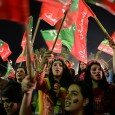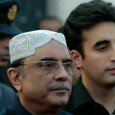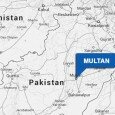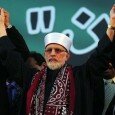By Waqar Gillani –
The sitting provincial governments are using all means to control local bodies’ polls as they are unwilling to share power
The delaying tactics and manipulations amid reluctance of the sitting provincial governments’ to share their power has stained the third-tier of governance – local bodies system- in Pakistan for the past several years.
The local bodies’ polls were due in August 2008 but remained shelved under political designs even in the former Pakistan Peoples Party (PPP) regime, in this sizably populated under-developing country.
Balochistan, a conflict-hit province with the lowest population, is the only area where LB polls have taken place till now. However, the process of elections for district mayors remains incomplete.
The governments of Punjab, Sindh and Khyber Pakhtoonkhawah trying their best to linger these polls despite their commitments to the people of Pakistan in their May 2013 general elections manifestoes to hold the LB polls within 90 days of the formations of their government(s).
The biggest pressure for the local bodies’ polls on the newly elected set up came from the recently retired Chief Justice of Pakistan (CJP), Iftikhar Muhammad Chaudhry, who vigorously pursued the federal government to conduct the elections as soon as possible. Ground realities at the moment clearly suggest that holding local government elections in three provinces is not possible in the coming few months.
The Election Commission of Pakistan (ECP), the constitutional authority to conduct these polls, does not seem capable to hold the LB polls in these provinces mainly because of lack of capacity to hold them at such a large scale as this is first time the commission is legally assigned with this task.
In view of the recent judgments of the high courts of Punjab and Sindh, the Punjab Local Government Act 2013 and Sindh Government Act 2013 need to be amended with the fresh delimitations of the union councils and wards at street level according to the defined legal course.
According to the last revised polling schedules, the LB polls were due in Sindh on this January 18 and in Punjab on January 30. Now, the LB polls schedule possibility seems only after the resolving the issue of objection-free delimitations in all provinces. The ECP also told the courts that printing of ballot papers was not possible in the previously scheduled dates.
In the Punjab, Pakistan Tehrik-e-Insaf (PTI) challenged the delimitations saying that the provincial government was not following the legal course. The court dismissed the new delimitations scheme and directed to go for new scheme according to legal procedures. Along with efforts to delay the polls, everything possible is being done in Punjab and Sindh provinces to manipulate LB polls in favour of the sitting provincial regimes.
The provincial governments have made attempts to change delimitations and increase the pace of development works at street level to create a favourable environment if they have to go for the polls. The roads of Garden Town, a posh locality in the centre of Lahore, have been quickly repaired and reconstructed in order to woo the PTI voters because this was the only constituency in Lahore from where PTI candidate defeated former mayor of Lahore in general elections 2013.
Recently, the PML-N local offices have been packed and meetings were being chaired by the MNAs and MPAs to accommodate as many people as possible. As a result, in Lahore, the number of UCs went up from 150 to 271 in new delimitations.
The picture on ground was quite different as all members of national and provincial assemblies of the ruling PML-N in Punjab managed to create new union councils where they have sizable majority votes. The district administrations, including District Coordination Officers (DCOs), town and tehsil municipal administrations have accommodated people of choice in the elections. Revenue officers and lower staff of the revenue departments, including Patwaris and clerks in the existing Union Councils (UC) offices across Punjab, were used for favourable delimitations.
Even after the court directions in different appeals, the districts and provincial administrations have not paid heed to any complaint seriously. The exceptions are a few.
PTI has been at the forefront to protest against these manipulations. The political party has continued with its protests against the attitude of the district and provincial administrative tiers. “All was set for pre-poll rigging,” maintained Ejaz Ahmad Chaudhry, provincial president of PTI in Punjab, who moved court against alleged PML-N-wrongdoings.
“We are 101 percent sure what PML-N was going to do in the polls through delimitations and high pace of development works,” he said. “No space was given to any other party or group and bureaucracy and administration was made part of this rigging.” There was no transparency, Chaudhry said. In Lahore, he said, there were some union councils which were divided in parts far away from each other just because they had sizable vote bank in those streets. “This is against the law, constitution and rules.”
Even, the notifications of delimitations were being revised and issued to give favours to the PNMLN MPAs and MNAs till the last moment, Mr. Chaudhry said. He stressed that PML-N was not legally authorised to do these legalisation at its own as it was only ECP’s jurisdiction. “They don’t want transparent LB polls and that is why they will continue to bulldoze the legal procedures,” he said.
The biggest show of LB polls, whenever they take place, is likely to be seen in the Punjab, where PTI is considered as the toughest competitor of the ruling PML-N, which is being viewed as losing grip because of weak and unpopular decisions. In KP, the PTI government is doing the delimitations in coordination with the ECP and expects to hold LB polls in coming couple of months.
“The problem with a country like Pakistan in having transparent grass-root level political empowerment is that it is a centralised and federal model of governance. There is transfer of power in speeches but in practice there is no decentralisation,” Salman Abid, political analyst and activist who has extensively worked on the local level governance model, told Pique. “Even after 18th Amendment, provinces are not ready to transfer the financial, political and administrative powers to the districts,” Abid says.
He said the rulers do not want to lose their power and shrink their political role. He said Article 140A of the Constitution clearly suggest that the third-tier of governance should be properly functional.
In the new amendments, he said, the provinces are keeping the powers like 58(2) B, which were in the constitutions before 18th Amendment, to dissolve the governments. “The Chief Ministers are holding similar power to dismiss any district government,” he said. “Even, like making the general elections polls mandatory within 90 days after the dissolution of provincial assemblies, there is no law or constitutional amendment to make the LB polls compulsory after the dissolution of any local government.”
Bureaucracy has more powers in this model of LB structure in Pakistan. Abid considers the present efforts of the ruling regimes as attempts only to delay polls as much as possible. Also, the current political environment does not suit the ruling set up to go for this test.
In Sindh, where the sitting government of PPP brought objectionable laws to change the delimitations, the Muttahida Quami Movement (MQM) and other opposition parties moved courts and got favourable verdicts. The opposition in Sindh argued that the legal procedures in delimitations had not been followed and the new delimitation scheme was unconstitutional. Farogh Naseem, the counsel of MQM in the court, said that the delimitation was done on the basis of estimated population while law dictates that the census of 1998 should have been followed.
The opposition parties in Sindh accused the ruling PPP of repeatedly modifying the local government laws “to obtain results of its own choice in the upcoming local bodies’ polls”. PPP brought the changes in the middle of last December, a few weeks before the elections were scheduled. “Definitely, the ruling parties want to avoid local bodies polls because these local structures take the authority of the MNAs and MPAs whose job actually is only to legislate,” Suhail Warraich, senior journalist and political analyst, a vocal supporter of LB polls, said.
Warraich said the LB polls not only resolve the local issues at the street city and village level but also become a nursery for the national politicians. There is no other way to formulate power local cadres in the parties. Warraich said the ruling parties would make sure to not hold LB polls until they are certain of having full grip over these polls to sustain their power. Currently, the popularity graph of the ruling parties in their respective provinces seems to be on the decline.
“It is far better to conduct the LB polls as soon as possible because they will help common people and the issues will be resolved and public pressures will increase to improve governance from top to bottom,” Warraich said. The issue whether LB polls truly empower the state and the citizens remains a key question.
Currently, the Punjab and Sindh laws on LB polls are continuity of 1979 and 2002 ordinances made by military dictators. The appointment of mayor and all the major local body positions are subject to approval of the chief minister. Similarly, all budgets and financial authorities rest with the chief minister, making the concept of an empowered local government more like another layer of officials at the beck and call of provincial bigwigs.
In Pakistan, the LB polls were always manipulated to maintain central power. During Pervez Musharraf regime, when extraordinary reforms were brought in this third tier of governance, the ultimate issue became the transfer of power. The financial awards were not granted to districts. Police remained under control of provincial and federal set ups. Audit commissions at local level were not formed even they were legally required. Transparency remained a big issue.
“The people of the country and the civil society must increase pressure on the ruling elite to ensure LB polls. The true local empowerment can end disparity among the districts and regions and help in controlling extremism and terrorism and the fears of growing separatism,” Mr. Abid, the political analyst said.
The irony is that the state considers increasing its power by fully controlling the local government system but in reality the issue of centralisation of power is gradually weakening the federation state, Abid said.
“Provincial autonomy is not possible with out district autonomy.”
The writer is a journalist based in Lahore. He tweets at @waqargillani






























































































